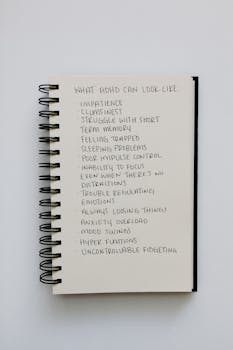What is eliminating distractions?

What is eliminating distractions?
In today’s fast-paced world, distractions are everywhere. They creep into our daily lives, whether we’re working, studying, or spending time with loved ones. Eliminating distractions is crucial for enhancing productivity and maintaining a healthy balance in our lives. By focusing on removing these interruptions, we can create an environment that fosters concentration and efficiency.
Understanding Distractions
Distractions can be defined as anything that diverts your attention from the task at hand. They can come in various forms, and understanding these types can help us address them effectively.
Internal Distractions
Internal distractions stem from our thoughts and emotions. They include worries about personal responsibilities, stress from work, or even daydreaming. When you’re trying to focus but find your mind wandering, you’re experiencing an internal distraction. Mental fatigue can also contribute to these distractions, making it harder to concentrate on a single task. For more insights on managing internal distractions, consider resources from the UNC Learning Center.
External Distractions
External distractions are the external factors that can quickly pull your attention away. These can include noise from your environment, notifications from your phone, or even the presence of other people. In recent times, technology has amplified these distractions. Social media, email alerts, and text messages can easily interrupt your workflow. Understanding these distractions can help you identify what needs to be minimized in your environment.
The Impact of Distractions on Productivity
Distractions can have a profound impact on productivity. They disrupt our focus, leading to decreased efficiency in both personal and professional settings.
Cognitive Overload
Cognitive overload occurs when we receive more information than our brains can process. This often happens when we’re juggling multiple tasks and distractions. When our minds are overwhelmed, it becomes nearly impossible to focus effectively on any one task. Research has shown that reducing distractions can significantly alleviate cognitive overload, improving our ability to think clearly and make decisions.
Time Wasted
It’s surprising how much time we lose to distractions. Studies indicate that people spend, on average, nearly two hours a day on distractions, whether it’s scrolling through social media or engaging in casual conversations. This time adds up, leading to a more significant loss of productivity. By recognizing how much time distractions steal from us, we can prioritize eliminating them.
Strategies for Eliminating Distractions
Implementing strategies to eliminate distractions can lead to a more productive life. Here are some actionable techniques:
Creating a Conducive Environment
Your workspace plays a critical role in your ability to concentrate. Start by decluttering your area; a tidy space can have a calming effect on your mind. Incorporate elements that enhance focus, such as noise-canceling headphones or plants. Additionally, consider using tools like Freedom to block distracting sites during work hours.
Prioritizing Tasks and Time Management
Using a prioritization method, like the Eisenhower Matrix, can help you decide what tasks are urgent and important. By creating a clear list of tasks and breaking them down into manageable steps, you can maintain focus on what truly matters. Time management techniques like the Pomodoro Technique can also help you stay on track, allowing for breaks in between focused work sessions.
Mindfulness and Focus Techniques
Practicing mindfulness can significantly improve your ability to concentrate. Techniques such as meditation or controlled breathing can enhance mental clarity over time. These methods help train your mind to recognize distractions and gently bring your focus back to the task at hand.
Benefits of Eliminating Distractions
Eliminating distractions has numerous benefits that extend beyond productivity.
Increased Productivity and Efficiency
When distractions are minimized, you will likely experience a noticeable increase in productivity. Tasks that once took hours can often be completed in a fraction of the time. This newfound efficiency allows you to achieve more in less time, freeing up your schedule for other activities or relaxation.
Improved Mental Clarity and Well-Being
Reducing distractions can lead to improved mental clarity. With less noise in your mind, you can make better decisions and think critically about the tasks at hand. Furthermore, when you manage to maintain focus, there’s often a boost in emotional well-being. Accomplishing tasks can lead to increased motivation and satisfaction.
Conclusion
Eliminating distractions is not just about improving productivity—it’s about creating a more fulfilled and balanced life. By understanding the types of distractions, recognizing their impact, and implementing strategies to combat them, you can make significant strides toward achieving your goals. Start small, focus on one area at a time, and watch as your productivity and mental clarity flourish. Embrace the journey toward a distraction-free life and enjoy the benefits that come with it.